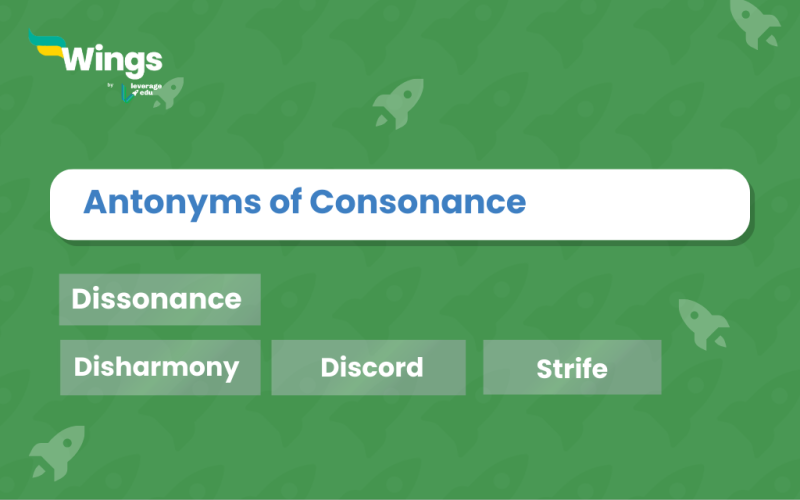The antonyms of “Consonance” are Dissonance, Discord, Disharmony, Inharmoniousness or Cacophony. To make an impression and get well-versed in vocabulary one should know at least a few antonyms of general words like “Consonance.” “Consonance” is a word that is regularly used in general day-to-day communication. We come across this word at least once a day. Not just this we also use its antonyms quite frequently.
Let us go further through the blog post to find more information on this antonym which will help us improve our vocabulary.
This Blog Includes:
Meaning of Consonance
Consonance refers to the pleasing combination of sounds or musical notes that create a sense of harmony and agreement. Particularly, consonance refers to musical notes in harmony. In literature, consonance is often used to describe the repetition of consonant sounds within a sentence or phrase. Simply put, the word consonance implies a sense of agreement or unity between elements.
Also Read: List of Antonyms
29+ Antonyms of Consonance
Antonyms of “consonance,” which refers to agreement, harmony, or compatibility, include words such as:
- Dissonance
- Discord
- Conflict
- Disharmony
- Disagreement
- Dissimilarity
- Incompatibility
- Contradiction
- Clashing
- Discordance
- Inharmoniousness
- Unison
- Opposition
- Contrast
- Dissension
- Divergence
- Variance
- Disunity
- Incongruity
- Discrepancy
- Contrariness
- Irreconcilability
- Rivalry
- Antagonism
- Strife
- Tension
- Turmoil
- Hostility
- Friction
- Unconformity
Also Read: Antonyms of Consent, with Meaning and Examples
Antonyms of Consonance: Usage with Examples
Given below are some examples of how the antonyms of “consonance” can be used in a sentence:
- Dissonance – Dissonance is the opposite of consonance, characterized by a harsh and unpleasant combination of sounds or musical notes.
Example: The dissonance in the music piece left the audience cringing, as the clashing notes grated on their ears. - Discord – Discord signifies a lack of harmony or agreement, often used to describe conflicting elements.
Example: The discord in the group’s decision-making process led to confusion and disagreement among its members. - Disharmony – Disharmony refers to a state of being out of harmony or not in agreement. Example: The disharmony in their relationship became evident when they constantly argued over trivial matters.
- Inharmoniousness – Inharmoniousness denotes the quality of not being harmonious, resulting in a lack of agreement or coordination.
Example: The inharmoniousness of the colours in the painting made it difficult to appreciate its beauty. - Cacophony – Cacophony refers to a harsh and chaotic mixture of sounds that create a noisy and unpleasant effect.
Example: The street was filled with the cacophony of honking horns and blaring sirens during rush hour. - Clashing – Clashing signifies a collision or conflict between contrasting elements.
Example: The clashing opinions of the committee members led to a deadlock in the decision-making process. - Strife – Strife is a state of conflict, discord, or disagreement, often used in interpersonal or societal contexts.
Example: The ongoing strife between the two neighbouring countries has resulted in tension and unrest in the region. - Jarring – Jarring describes something that is incongruous, discordant, or unpleasant to the senses.
Example: The jarring noise from the construction site disrupted the tranquillity of the peaceful neighbourhood. - Unharmonious – Unharmonious means not harmonious or not in agreement.
Example: The unharmonious blend of flavours in the dish left a bitter taste in the diners’ mouths. - Dissidence – Dissidence refers to disagreement or opposition to established beliefs, practices, or authority.
Example: The dissidence within the political party led to internal conflict and a divided front during the election campaign.
Also Read: Antonyms of Misogyny with Meaning and Examples
Antonyms of Consonance Quiz
Instructions: Choose the best antonym for “consonance” in each question.
- Which of the following words is the strongest antonym of “consonance” in a musical context?
- a) Agreement
- b) Harmony
- c) Dissonance
- d) Similarity
- In a general sense, what word describes a lack of agreement or harmony?
- a) Unity
- b) Accord
- c) Discord
- d) Cohesion
- Which word signifies a harsh, clashing sound?
- a) Melody
- b) Cacophony
- c) Rhythm
- d) Tone
- When there is a lack of harmony in relationships, what term is often used?
- a) Amity
- b) Disharmony
- c) Congruence
- d) Affinity
- What word describes a state of conflict or disagreement?
- a) Peace
- b) Strife
- c) Calm
- d) Tranquility
Answers:
- c) Dissonance
- c) Discord
- b) Cacophony
- b) Disharmony
- b) Strife
Find similar blogs on Learn English!
FAQs
Generally, “consonance” refers to agreement or harmony. In music, it describes a pleasing combination of sounds. In literature, it can refer to the repetition of consonant sounds.
The primary antonyms include:
Dissonance: Especially in musical contexts, it signifies clashing or harsh sounds.
Discord: Represents a lack of agreement or harmony, often in relationships or opinions.
Disharmony: Similar to discord, it indicates a lack of harmoniousness.
Cacophony: Refers to a harsh, discordant mixture of sounds.
Strife: represents conflict, and disagreement.
In a musical context, “dissonance” is the most precise antonym.
When discussing relationships or opinions, “discord” or “disharmony” are more appropriate.
When discussing harsh sounds, cacophony is the best term.
When describing conflict, strife is the best term.
Yes, other related words include:
Conflict
Disagreement
Incompatibility
Inharmoniousness.
Knowing antonyms:
Expands your vocabulary.
Improves your ability to express nuanced meanings.
Enhances your understanding of word relationships.
Helps to improve writing skills
This was all about the antonym of “consonance” meaning and examples. Hope you understood the concept where it’s used. For more such blogs, follow Leverage Edu.


 One app for all your study abroad needs
One app for all your study abroad needs












 60,000+ students trusted us with their dreams. Take the first step today!
60,000+ students trusted us with their dreams. Take the first step today!